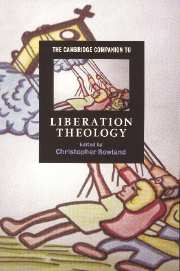Book contents
- Frontmatter
- Introduction
- Part one Contemporary liberation theology
- 1 The task and content of liberation theology
- 2 Liberation theology in Asia
- 3 Black theology
- 4 Feminist theology: a critical theology of liberation
- Part two Aspects of liberation theology
- Part three Analysis and criticism
- Epilogue: the future of liberation theology
- Select bibliography
- Index
4 - Feminist theology: a critical theology of liberation
from Part one - Contemporary liberation theology
Published online by Cambridge University Press: 28 May 2006
- Frontmatter
- Introduction
- Part one Contemporary liberation theology
- 1 The task and content of liberation theology
- 2 Liberation theology in Asia
- 3 Black theology
- 4 Feminist theology: a critical theology of liberation
- Part two Aspects of liberation theology
- Part three Analysis and criticism
- Epilogue: the future of liberation theology
- Select bibliography
- Index
Summary
Feminist theology is a global theology, or rather, a family of contextual theologies committed to the struggle for justice for women and the transformation of society. It is therefore a critical theology of liberation engaged in the reconstruction of theology and religion in the service of this transformation process, in the specificity of the many contexts in which women live. Whereas in European and North American contexts the term 'feminist theology' is most frequently accepted, in other parts of the globe, in order to heighten visibility, recognise identity and respect the diversity of experiences and goals, the different theologies of Asian, African and Latin American women have acquired their own distinctiveness, together with Womanist theology (the theology of the United States black American women and women of colour), and Mujerista theology (the liberation theology of Hispanic women). Increasingly emergent is the spirituality of, for example, indigenous American Indian women and indigenous Indian women in Latin America, as well as of aboriginal women in Australia, New Zealand and the Pacific.
If there is a commonality of purpose in all this diversity, it is the liberation of humankind together with all sentient life. The words of the American poet Adrienne Rich are widely inspirational:
My heart is touched by all I cannot save;
So much has been destroyed
I have to cast my lot in with those who
with no extraordinary power
re-constitute the world.
- Type
- Chapter
- Information
- The Cambridge Companion to Liberation Theology , pp. 89 - 106Publisher: Cambridge University PressPrint publication year: 1999
- 4
- Cited by

